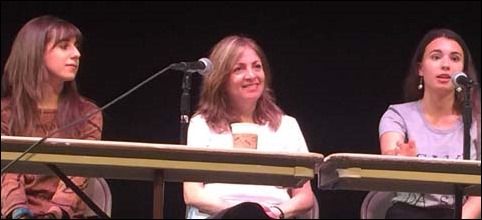Superpod 5: Scholar-Advocacy at Its Best

About 200 people gathered on San Juan Island, Washington, from July 19 -23 for the Superpod 5 meeting. It was the fifth in a series of annual gatherings on the island open to the public and attended by an international group of scientists, filmmakers, authors, journalists, former trainers, naturalists and orca advocates.
The theme of this year’s gathering was “The Future”, and a new feature was added, the Scholar-Advocacy Conference, which highlighted students and young people applying their education and professional skills to marine mammal conservation, welfare and advocacy in a broad range of ways.
The Scholar-Advocacy day featured outstanding talks by several young scholar-advocates.
Mariah Kirby, a 20-year-old biology major and aspiring marine mammal researcher from the University of Missouri, St. Louis, discussed how she uses social media to advocate for orcas and other cetaceans.
A powerful and professionally-produced exposé of the plight of captive dolphins and whales.
Michelle Strom, a 15-year old high school sophomore from Columbia, South Carolina, who has created a popular website called Cetacean Awareness, a user-friendly and informative site featuring information about captive and wild cetaceans, a blog, and suggestions for how the public can get involved in advocacy, talked about her goal of becoming a marine mammal scientist.
Ella Van Cleave, a college student in British Columbia and a “Superpod veteran” at age 18, showed her latest project, a trailer for her film proposal aimed at reconnecting teens with the oceans entitled “To The Sea”.
And Katie and Abbie Emmons, two young filmmakers who founded the international non-profit student advocacy group Blue Freedom, premiered their documentary “Voiceless”, which earned them a standing ovation. The film is a powerful and professionally-produced exposé of the plight of captive dolphins and whales, capturing in a unique way all of the high emotional points of the films “The Cove”, “Blackfish” and “A Fall from Freedom” in about 30 minutes. Katie and Abbie, with wisdom beyond their years, explained that they chose to make a short film that can easily be shown in classrooms.
The panel discussion comprised a mix of established scientists, including Dr. Jeff Ventre, Dr. Naomi Rose, Dr. Ingrid Visser and myself, joined by the Emmons sisters, Ella Van Cleave and Mariah Kirby. All talked about what scholar-advocacy means to them and how important it is to be informed and educated about marine mammals when advocating for them. Katie Emmons reiterated the message of scholar advocacy – knowledge is a tool that can be used to create positive change in the world. And Ella Van Cleave spoke eloquently about how important it is to not be pigeonholed into one area or another while in school. The more well-versed you are in a variety of areas the more effective you are as an advocate.
Naomi Rose, Ingrid Visser and I also shared our own stories of how we became scholar-advocates for marine mammals and some of the unique professional issues we face from being prominent scientists and advocates. All of us have faced professional criticism from the scientific community because of our advocacy for other animals, but we also realize that, as scientists, we are especially formidable advocates for the animals we want to protect. You can view the panel session here to hear everyone’s insights.
As these teenaged scholar-advocates talked about their projects the audience’s attention was also captured by an even younger voice: that of 9-year-old London Fletcher from Washington State. London is already an outstanding scholar-advocate with intelligence and maturity beyond her years. A cute wisp of a girl with big eyeglasses, she is an active volunteer responder for the Whatcom Marine Mammal Stranding Network, and was awarded Volunteer of The Year in 2015. She is also working currently to raise awareness about the need to free salmon from the lower Snake River dams to help the starving orcas and other cetaceans in the region.
This was the first scholar-advocacy conference at Superpod but it will surely not be the last. I was inspired by the intelligence, energy and compassion of all of the young advocates representing the future, and the whole experience reinforced the view that knowledge is power.
The future is in very powerful hands!
3 Replies to “Superpod 5: Scholar-Advocacy at Its Best”
Comments are closed.


Excellente!! Great idea to show case our youth and provide them with Superpod role models
Your a genius!
Glad to see scientists becoming unafraid to speak out against what they perceive as a moral failure of society, the imprisonment of marine mammals. Hope I can join the Superpod one of these years.
Gone are the days when you could simply rely on standing outside a captive animal facility raising public awareness to demand its’ closure. It was heartening to see young advocates, so dedicated to becoming better informed on the issues surrounding captivity. This is the modern, effective method of campaigning. Science fact is a crucial component – it helps support campaigners claims and at times, can assist with changes in legislation. I applaud the scientists and professionals who have been/are willing to stand up and be counted – dedicating their expertise to be a driving cause for good.